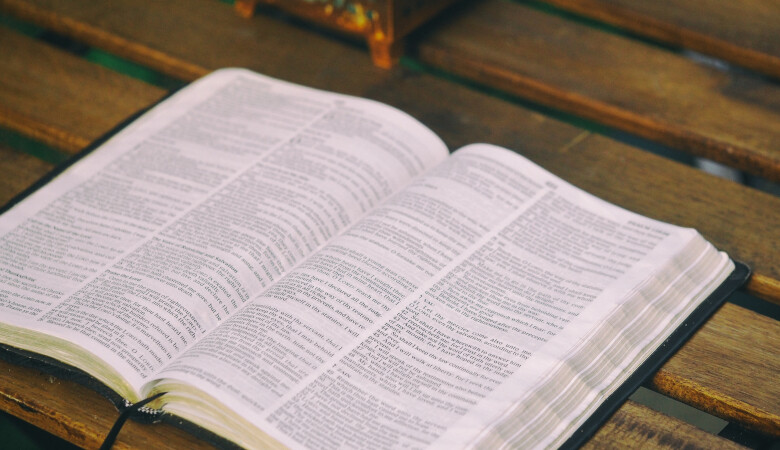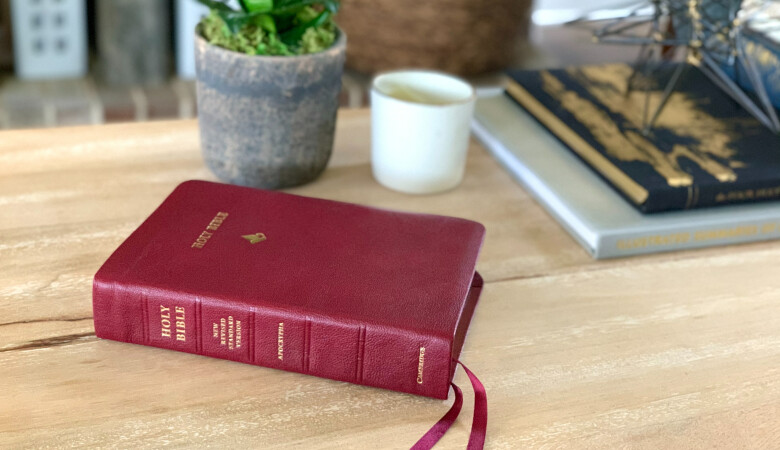Belshazzar's Last Feast (Daniel Sermon 8 of 17)
February 11, 2001 | Andy Davis
Daniel 5:1-31
Works of the Flesh, Judgement Day
I. From Pride to Presumption
Turn to Daniel 5. We continue in our study in Daniel and we come to Belshazzar's last feast. Now around this room, there are many timepieces, aren't there? Some of you may even be checking them right now. There are many different ways to mark time, and we're getting better and better at it. I saw an advertisement in a magazine which has a wristwatch, which automatically changes its time as you change time zones. I don't know how that works, but it's got some kind of a receiver within it, that takes data from an atomic clock somewhere, and wherever you are, you know exactly what time it is, you don't have to fiddle anymore with adjusting, isn't that incredible? We're very conscious of time and interested in telling time. And so it has been really from the beginning of the world, since God created the sun, and the moon, and the stars to mark time and as we see the sun come up and set, we're interested in the passing of time, so we see the moon's wax and wane. We're interested in the passing of time. Some of the earliest timepieces were water clocks. I was reading about one in Egypt, which had a certain rate that the water flowed out of a vessel and they were able to mark the time within a day that way, there was a remarkable water clock in China that lasted for over 100 years and kept very accurate time.
But we're going to see that God's ways of marking time are different than ours, although He has them and there is a timetable that God is keeping though we don't know what it is. And God has given us insight into time, but His times are His own. Jesus was born in the fullness of time it says in Galatians 4:4, at just the right time in history. We know that today is given to us for a purpose, isn't it? For repentance. Today is the day of salvation, that we might call on Jesus Christ, and be forgiven of our sins. That's what today is for, for repentance and day passes upon day and time is marked. But in God's time, the judgments come and at just the right time, they come. God gave a promise to Abraham that he would own the promised land in the future but not yet. And why? The sin of the Amorites had not yet reached its full measure. God had a certain measure and when the sin of the Amorites had reached that measure, judgment would come by the sword of Joshua and the invading armies, in the Book of Joshua but not yet. God has His timetable and so He had for the ancient empire of Babylon. There was a right time for judgment and until that time came judgment would not come, but when that time came, the judgment fell and nothing could stop it.
Now, about 60 or so years before the chapter we're reading today, there was a strange ceremony carried on by a Jewish refugee, his name was Seraiah and Seraiah stood by the flowing river Euphrates, as it flowed through the center of Babylon, and he read a scroll in Hebrew, the scroll was written by a prophet, a Jewish prophet and it had some words in it. Now, I don't know what went on when the scroll was read. I don't know if the Babylonians were hurrying to their jobs, maybe some of them were late going to and fro but here was this group of refugees, standing by the river Babylon or the River Euphrates in the center of Babylon, and the scroll being read. And when the reading was finished, Seraiah wrapped it up and tied a stone to it and threw it into the center of the Euphrates River and there it sank. Ceremony was over. What did it mean?
Well, the meaning was contained in the words of the scroll. We'll get to that. But some time later, the waters of the Euphrates River started to dwindle on one given night, got a little bit dryer. Dwindled down from a river, a mighty river to a stream, to a trickle and then it was dry, river bed just mud and there perhaps, 60 years later, the stone that had been thrown in by Seraiah was there. I'm sure the scroll and its string was disintegrated. That's what time does. But maybe the rock was still there, testimony that the time had come for judgment. Babylon would fall that night.
And it just so happened while that river was dwindling down and running dry, there was a big party going on. We can relate to that, can't we? We're a partying people? We enjoy a good party. And Belshazzar was throwing the party, the feast. It would be his last, his last feast, but he was throwing a party. Fascinating. With judgment impending, they're throwing a party and a feast. And so we're going to look tonight or today at Belshazzar's last feast, Daniel 5 and we're going to see a specific and accurate fulfillment of prophecy that God had given through His prophet Jeremiah. We have up to this point in Daniel seen many prophecies laid out, which have not yet been fulfilled, haven't we? Future prophecies that are going to be fulfilled at the second coming of Christ. But Daniel 5 is not of a future prophecy, but of a past prophecy and it's fulfillment, the fall of Babylon. And we're going to see how accurate it is.
II. Historical Context: Babylon After Nebuchadnezzar
Now, instead of reading through these verses all the way through and then going back and explaining them, I think we're going to look at it section at a time, but before we do it, we're going to get the historical context. What had gone on now is that Nebuchadnezzar has died. The head of gold, you remember the statue in chapter two. It was a statue, which represented the flow of human history and the top was a head of gold and according to Daniel, Nebuchadnezzar himself was that head of gold, he represented the Babylonian Empire. Well, Nebuchadnezzar has now died, we don't know how he died. We don't have any record of him being assassinated, perhaps he died through an illness, but he died 562 BC. In the words of David, he went the way of all the earth, the way of all potentates, all his power is gone and now he's going to stand before the Judge. We pray that in Daniel 4, he came to repentance and came to faith in Christ, and we hope we see him in heaven but his time on earth has ended. Nebuchadnezzar's successors however were not like Nebuchadnezzar. He was the head of gold, his successors were nothing like him.
There was incompetence, there was intrigue, there was idolatry, there was not strong leadership. His son Evil-Merodach or Amel-Marduk ruled for only nine years and then he was assassinated by one of the generals in the army, Neriglissar. Neriglissar assassinated Nebuchadnezzar's son, and then took the throne. Eventually he died and his son was placed on the throne for nine months. There was a conspiracy and his son was assassinated. Just one toppling after another, it became very weak, very unstable.
Finally, the leader of the second conspiracy Nabonidus took the throne and ruled until the end of Babylon. Along with him he took a wife Nitocris who was a daughter of Nebuchadnezzar, she was a direct daughter of Nebuchadnezzar and the two of them had a son and the son's name was Belshazzar. And when Belshazzar was old enough Belshazzar became co-regent ruling together with his father Nabonidus. Now, going back in time, Jeremiah 27, you don't have to turn there, but there's a clear prophecy given about not only the fall of Babylon but when it would come. Jeremiah the prophet gathered a bunch of small kings including the king of Israel or Judah to him. This is before Nebuchadnezzar had conquered anything. He gathered all these kings together and said all of you kings are given into the hand of Nebuchadnezzar. This is what he says, "Now I will hand all your countries over to my servant Nebuchadnezzar, king of Babylon, I will make even the wild animals subject to him, all nations will serve him and his son and his grandson until the time for his land comes then many nations and great kings will subjugate him."
Do you see the time table? Three generations. And in the third generation, his grandson, the end would come. Belshazzar was his grandson. The accuracy of prophecy, very clear how long it would last. And so, Belshazzar was ruling. Now around that time, the Medes and the Persians started getting powerful. Cyrus the Great became the leader of that budding empire. And he began to conquer. He began to ride out over Babylon and began to win victories and he defeated Nabonidus in a critical battle and Nabonidus fled to Borsippa where he was captured. Cyrus the Great then turned his attention on Babylon itself, the city of Babylon. The armies of Babylon had pulled back inside the walls of that fortress. Belshazzar was pretty much all that was left, but that city had never been conquered. In all the history of the military annals there's never been a city like Babylon, a fortress it seemed unconquerable and so they pulled in and they thought it was time for a party. And so they threw a feast.
III. Belshazzar’s Defiant Feast (vs. 1-4)
Now, let's look at verses one through four. "King Belshazzar gave a great banquet for a thousand of his nobles and drank wine with them. While Belshazzar was drinking his wine he gave orders to bring in the gold and the silver goblets that Nebuchadnezzar his father had taken from the temple in Jerusalem so that the king and his nobles, his wives and his concubines might drink from them. So they brought in the gold goblets that had been taken from the temple of God in Jerusalem, and the king and his nobles, his wives and his concubines drank from them. As they drank the wine, they praised the gods of gold and silver, of bronze, iron, wood and stone." Here, we see Belshazzar's defiant feast. The historical context couldn't be clearer, right at the walls of the city is the combined army of the Medes and the Persians, they're right around the walls, they're ready to conquer the city, but the Babylonians defy them with a feast, a celebration, a party, Belshazzar leading the way.
But not only do they defy the armies of the Medes and the Persians, they defied God Himself, God Almighty, the Creator of the ends of the earth by calling for the golden goblets and cups from His temple that Nebuchadnezzar had taken out. Nebuchadnezzar never did this but Belshazzar did and they took them out and they drank, they drank celebrations to gods of gold and silver, of bronze, of iron, wood and stone. Now, massive banquets are part of the ancient Near East tradition. It shouldn't surprise us that everyone in Babylon was at a party. The ancient historian Ktesias said that Persian monarchs who came later frequently were known to dine daily with 15,000 people, that's a big feast. Earlier the Assyrian emperor Ashunasirpal II gave a feast to 70,000 people. In 485 Persian king Darius had a feast in which a thousand animals were slaughtered including, get this, oxen, zebras, gazelles, stags, Arabian ostriches, geese, game cocks and camel. Turns out that smoked camel hump is a favorite Persian dish. So those are the kind of things that they ate. They also served rice pilaf with meats, nuts, spices and fruit. Shish kebabs of mutton, fish, poultry, vegetables seasoned with special yogurt sauce. The guests at that banquet even enjoyed sugar brought by caravan from distant lands as at that time sugar was eaten only by kings. But it was lavished on all the guests. Now, that was a later feast, but this is the kind of thing that was going on as the armies were surrounding the walls of Babylon.
Now what brings this on? Well, it's a base innate hedonism, a desire we have to enjoy things. We like pleasure, don't we? We like to eat good foods, we like to have fun with our friends. Is there anything wrong with that? Well, no, as long as it's in its proper order with God at the center. But hedonism for its own sake is destructive. And so it says in Philippians 3:19, think of the Babylonians now, "Their destiny is destruction, their god is their stomach, and their glory is in their shame, their mind is on earthly things." That was Babylon that night, wasn't it? One of the most amazing things I found about the history of World War II is that as Berlin was about to fall and Hitler and all his leaders were down in a concrete bunker and the whole city was surrounded by the Red Army and the forces were crumbling at that moment, even after Hitler had committed suicide, the Nazi officials had a party, a big celebration.
There's something innate inside us that wants to be happy, we want to celebrate, we want to have fun even if death is imminent. And so from the Scripture comes this slogan, "Let us eat and drink and be merry for tomorrow we die." And nothing could have ever been said more truthfully about Babylon. Actually, it wasn't tomorrow, it was tonight. What should they have been doing? They should have been taking the time repenting. They should have been on their faces before God, seeking His forgiveness, not drinking from His vessels and praising idols of gold and wood and stone, getting drunk. But you know, it's not very different in God's own people either. Isaiah 22, writing about the fall of Jerusalem they did the same thing. This is what Isaiah says about the fall of Jerusalem, "The Lord, the Lord almighty called you on that day to weep and to wail, to tear out your hair and put on sackcloth but see there's joy and revelry, there slaughtering of cattle and eating of meat, killing of sheep and drinking of wine. Let us eat and drink you say for tomorrow we die. The Lord Almighty has revealed this in my hearing to your dying day this sin will not be atoned for." When it's time to repent, you need to repent. It's not time for a party, it's not time for celebration, it's time for repentance.
The Greatness of Babylon
But you know something. I don't think the Babylonians felt they were going to die tomorrow. Let us eat and drink for tomorrow we... I don't think they thought so. I think they felt confidence. They were able to perhaps before the party began at least stand up around the walls of Babylon and defy the Medo-Persian army and say, "You'll never get in here. Never. These walls have never fallen and they're not going to fall tonight." Now in siege warfare there are three ways to win. If you're the army besieging a city what are three ways to win? You can go over the wall, you can go through the wall or you can starve the city within the wall so they come out. Those are the three ways you win siege warfare. But according to Herodotus, the ancient historian none of the three were possible because the city was monstrously huge. 14 miles square on a side, that's big. Think of how far it is from here to Raleigh. 14 miles on a side was the city. It had huge outer walls, 350 feet high. That's a 35-story building. Somebody tell me, is there a 35-story building in downtown Durham? I don't think there is, 35 stories is big.
So imagine the highest building in Durham and even higher and you're looking up, and that's the wall, you're not going over that wall. I don't care how much structure you bring you're not going over. How about going through it? Well, according to Herodotus at the top of the wall, you can drive a chariot with four horses. That's at the top. Do you think the top is thinner or thicker than the bottom? It's got to be thinner, that's the way a wall is. It's got to be built almost like a pyramid. Some of the walls were 87 feet thick, 87 feet thick. You're not getting through that way. Well, what about the starvation route? Well, the problem is that the city was so big that it encompassed fields, areas that could continue growing for years and they had huge store houses. And what about drinking water? Plenty of it, you've got the River Euphrates flowing right through the center of the city, plenty of drinking water, you're never getting in here. Ancient Babylon was unconquerable. It had a 100 great bronze walls, gates in the walls, the inner and outer wall system had a series of moats, the river water was diverted around the wall so that you couldn't get through that way. Within the walls, there are a beautiful avenues and parks and palaces. A great bridge spanning the Euphrates connected the eastern and western parts of the city. There was the famed, Hanging Gardens of Babylon, beautiful to look at, and it gave them confidence.
It's the same thing that Nebuchadnezzar said when he said, "Is not this the great Babylon I have built as a royal residence by my mighty power and for the glory of my majesty?" This is an incredible place and nobody's ever getting in here. And so they held a party. They had a banquet. It's really shocking when you stop and think about it. When you're in siege you want to conserve food, you don't want to have a banquet but that's exactly what they did. So, they defied the armies of Persia, they also defied the living God. Now this is particularly shocking because God had given Nebuchadnezzar and the Babylonian empire a lesson into His greatness. Daniel representing God had interpreted a dream that no one else knew. Miraculously he had read the king's mind. In Daniel 3 Shadrach, Meshach and Abednego had been rescued from the fiery furnace, God had showed His power. In Daniel 4 the most powerful man perhaps in the history of the world in terms of a monarch, a single ruler was turned into an animal for seven years by the God of Israel, and Nebuchadnezzar gave credit to Him, gave credit to the God of Israel, the God of Abraham, Isaac and Jacob. Was the one who did that. "He rules over kings" he said. But none of that meant anything to his grandson, Belshazzar. Didn't think a thing of it. And so he said, "Who was that God we beat? Bring his cups in here, let's drink from those too." Defying God right in His presence.
Jonathan Edwards in his famous sermon, Sinners in the hands of an angry God, said this and I think the words really strike to their situation. He's talking about God's power and he says, "There is no fortress that is any defense from the power of God. Though hand joining hand and vast multitudes of God's enemies combine and associate themselves they are easily broken in pieces. What are we that should think to stand before Him at whose rebuke the earth trembles and before whom rocks are thrown down."
IV. God’s Terrifying Warning: “The Writing on the Wall” (vs. 5-9)
Oh, the folly of human beings to defy God. Now in verses 5-9, there is the terrifying warning, the writing on the wall, the apparition appears. Now look up at the wall next to me, see that plaster up there, how would you feel right now if while I'm talking suddenly a hand appeared and started writing on it? What would you do? Would some of you scream? Would you run out? Would you stay and wonder what the writing said? Well, that's what happened in middle of the party. Right in the middle of the party the hand appears look at verse 5, "Suddenly the fingers of a human hand appeared and wrote on the plaster of the wall near the lampstand in the Royal Palace. The king watched the hand as it wrote, his face turned pale and he was so frightened that his knees knocked together and his legs gave way. And the king called for the enchanters, the astrologers and diviners to be brought and said to these wise men of Babylon, 'Whoever reads this writing and tells me what it means will be clothed in purple and have a gold chain placed around his neck and he will be made the third highest ruler in the kingdom.' Then all the king's wise men came in, but they could not read the writing or tell the king what it meant. So King Belshazzar became even more terrified and his face grew more pale and his nobles were baffled."
Right in the middle of the party, the music stops. Now when the Titanic went down, the music kept playing until that it was the last possible moment, but music stopped a little early this night because people were terrified. What did the writing mean? What was it? What was the significance of these fingers and what were the letters? And terror and confusion reigned and no one knew what to do. And so the wise men were called in but nobody could read it. Maybe it's on the cover of your bulletin. Have you seen that little odd thing? Can you read it? There it was, something like that. And no one knew what it said.
V. Daniel’s Clear Interpretation: The End Has Come (vs. 10-28)
The Queen Mother’s Advice (vs. 10-12)
And so the Queen Mother comes in verse 10-12, and gives some advice, "The queen hearing the voices of the king and his nobles came into the banquet hall. 'O king, live forever' she said. 'Don't be alarmed, don't look so pale. There is a man in your kingdom who has the spirit of the holy gods in him. In the time of your father he was found to have insight and intelligence and wisdom like that of the gods. King Nebuchadnezzar, your father, your father the king I say, appointed him chief of the magicians, enchanters, astrologers and diviners. This man Daniel whom the king called Belteshazzar was found to have a keen mind in knowledge and understanding, and also the ability to interpret dreams and explain riddles and solve difficult problems. Call for Daniel and he will tell you what the writing means.'" It's very interesting this woman is not at the banquet, she's the Queen Mother, I believe Nitocris, Nebuchadnezzar's daughter, and she hears probably screaming from the banquet, she hears the voices of the nobles and others, and so she comes in and, "What is going on?" and she finds out and she says, "Listen, don't worry about it, just get Daniel and he'll come in and he'll interpret it for you."
Interesting that Daniel didn't come with the other lot, did he? That group of enchanters and... He didn't have anything to do with them. He came in on his own to interpret. And it's interesting what the Queen Mother said to him, do you notice what she said when she first came in. What did she say, "O king live forever." Isn't that ironic? Would the king live forever? No, actually he's hours away from his death. Hours away, he wouldn't survive the night.
Daniel’s Appearance (vs. 13)
And so Daniel appears in verse 13, as usual he refuses to be associated with them. Verse 13, "So Daniel was brought before the king and the king said to him. 'Are you Daniel? One of the exiles my father, the king, brought in from Judah? I have heard that the spirit of the gods is in you, and that you have insight, intelligence and outstanding wisdom. The wise men and enchanters were brought before me to read this writing and tell me what it means, but they could not explain it. Now, I have heard that you are able to give interpretations and to solve difficult problems. If you can read this writing and tell me what it means, you will be clothed in purple and have a gold chain placed around your neck and you'll be made third highest ruler in the kingdom.'"
So, Belshazzar gives him a quick account of what's going on and of the failure of his counselors and he makes him that offer. Now, what are the three things that the world has to offer? We've said before, power, prestige and pleasure, those three I'll give them to you, they're mine to give. I can give them to anyone I want and I give them to you. And what does he say? Verse 17, "Then Daniel answered the king, keep your gifts for yourself and give your honors to somebody else." I have no interest. Now, I wonder if Daniel knew that that would be the night. I wonder. According to archaeology they have found a large banqueting room on the ruins of Babylon. They found a recessed area elevated where there may have been a throne. Interestingly enough, they found plaster on the walls. Some of the plaster was gone, decayed by age, I'm sure or maybe something else raked it off. You can't really tell, but there was a window in that room and it overlooked the Euphrates River. And if they had just taken the time and go look, they would have noticed something about the river, the river was dwindling, the river was drying, the river was gone. Where is the river? Maybe Daniel knew where the river was. Maybe he knew what was going on, maybe he knew that that was the night.
Daniel Teaches History (vs. 18-21)
And so, Daniel teaches the king some history, verses 18-21, "O king, the Most High God gave your father Nebuchadnezzar sovereignty and greatness and glory and splendor. Because of the high position He gave him all the peoples and nations and men of every language dreaded and feared him. Those the king wanted to put to death, he put to death, those he wanted to spare he spared, those he wanted to promote he promoted and those he wanted to humble he humbled. But when his heart became arrogant and hardened with pride, he was deposed from his royal throne and stripped of his glory. He was driven away from people and given the mind of an animal, he lived with the wild donkeys and ate grass like cattle and his body was drenched with the dew of heaven until he acknowledged... " until he acknowledged what? What is the lesson? What is the lesson of the book of Daniel? "that the most high God is sovereign over the kingdoms of men and He gives them to anyone He pleases."
How many times have we heard the lesson? Over and over. And Belshazzar, you've not learned your history. Well, I never did well in history. Well, you need to do well in history. God isn't going to do an Exodus every generation. He's not going to have Jesus die every generation, He's not going to have Him rise from the dead every generation. He's going to give you a book and the history is written in the book, He's not going to do these same things year after year. He's going to give you a book and you read it in the book and you believe it or you don't. But here's the history and we need to learn from history. Belshazzar, you should have learned from what your father learned. What happened to your father? God was gracious and gentle to your father because he survived. But instead you defied Him. You set your heart against Him.
And so Daniel preaches judgment verses 22-24, "But you his son, O Belshazzar, have not humbled yourself, though you knew all this. Instead, you have set yourself up against the Lord of heaven. You had the goblets from His temple brought to you and you and your nobles, your wives and your concubines drank wine from them. You praised the gods of silver and gold, of bronze, iron, wood and stone which cannot see or hear or understand. But you did not honor the God who holds in His hand your life and all your ways. Therefore He sent the hand that wrote the inscription." Is it still true that this God holds in His hand your life and all your ways? Are there many gods or is there only one God? And is that one God eternal or does He die? Does He change? Is He changeful or is He always the same? You have not humbled yourself, Belshazzar, you should have learned, but you did not honor the God who holds in His hand your life and all your ways and therefore, the inscription has been sent.
Now why, why does God send the inscription? Why doesn't He just bring the judgment? Well, sometimes He does just bring the judgment but God delights to tell you ahead of time what He's going to do. He writes it down in Scripture and tells you ahead of time what's coming so that you will know that He tells the truth. And so we have prophecies in the Old Testament fulfilled in the Old Testament, in the New Testament or yet to be fulfilled still. That's the way God is. He tells us ahead of time what He's going to do, and then He does it and so the writing comes on the wall and so we can read it and understand what God will do. This is the way he is, He writes and then He fulfills.
Daniel Interprets the Writing
And so then, Daniel interprets it. "This is the inscription that was written: Mene Mene Tekel Parsin. Now this is what the words mean: Mene: God has numbered the days of your reign and brought it to an end. Tekel: You have been weighed on the scales and found wanting. Peres: Your kingdom is divided and given to the Medes and the Persians." Look at that middle one. You've been weighed on the scales and found light. God's tested you and you've come short. "For all have sinned and come short of the glory of God." What is the Hebrew word for glory? 'Kavod', which means weight, heaviness you don't have the glory of God. You come short of the glory of God, and you're found wanting.
Now back in the ancient Near East, they had scales, and merchants would have a scale and they'd have weights. Woe to you if you had a deceptive weight or a tricky weight, but they put the weight and then they'd weigh out whatever they were selling. Belshazzar, you've been weighed and you're found wanting, you're a lightweight. You have not the glory of God in your heart and so your kingdom is brought to an end and your days are numbered, they're counted out. They will serve the father, the son and the grandson and in the days of the grandson the judgment will come. Your days are numbered out and they've come to an end and your kingdom is divided out and given to the Medes and the Persians.
VI. Daniel Exalted, Belshazzar Destroyed (vs. 29-31)
Well, verse 29, "At Belshazzar's command Daniel was clothed in purple, a gold chain was placed around his neck and he was proclaimed the third highest ruler in the kingdom." Oh, I'm sure that made Daniel feel so happy and proud. Go home and tell his friends, Hananiah, Mishael and Azariah, "Look what the king gave me, isn't this wonderful?" Do you think so?
How worthless are the baubles the world gives? They mean nothing. The honor and praise of the world means nothing. You get to be the third highest ruler of a kingdom that's going to fall tonight. Now, by the way what usually happens to the third highest ruler of the previous regime when the new regime comes in?
Usually, but not Daniel, he's going to survive into chapter 6. We'll see him, Daniel, in the lion’s den and he gets made the third highest ruler in that kingdom. Only the hand of God can do that. Daniel survived this night because he trusted in God. But there he is with his gold chain and his purple robe and he survives the night. How can it be? And then in verse 30 and 31 "That very night, Belshazzar, king of the Babylonians, was slain and Darius the Mede took over the kingdom at age 62." Judgment comes suddenly, just like that. Even while going about his business, suddenly it ends. Reminds me of Jesus' parable about the rich fool, remember? The guy has lots of stuff and his house is too small and so he decides to build bigger barns, you remember? I've got lots of years to come, plenty of time to enjoy all the good things of this world, I'll build bigger barns. And remember what God said, "You fool! This very night your life will be demanded from you." And so it was for Belshazzar.
How It Happened
Now, how did it happen? Well, it's not recorded in the Bible, you won't find it anywhere in the Bible except in prophecy. It's set ahead of time in prophecy, but you have to go to the ancient historians, Herodotus and Xenophon. The date was October 11th and 12th, 539 BC. Cyrus the Great of Persia was surrounding the walls, and one of his generals Ugbaru was his name, noticed something. He saw an old canal that it turns out that queen Nitocris had dug and he got an idea and he said, "Why don't we divert the Euphrates River through this canal system so it doesn't flow under the wall and we'll crawl under the wall and into Babylon." That's an amazing idea, isn't it? The only problem with it is that obviously the Babylonians thought of that, so they placed traps around where the river flowed in so that the soldiers could kill easily, anyone crawling under the wall. So we have to be sure that there's no soldiers on the wall. So you need two things: You need a dried up river bed and you need no soldiers on the walls. And then the city will fall.
VII. Isaiah, Habakkuk, Jeremiah: A Clear Prophetic Light Fulfilled
Well, that is exactly the thing that God had predicted would happen. Now, I'm not going to go through the prophecies carefully. I'd like you to read them yourself. Isaiah 21:5. In Isaiah 21:5 two hundred years beforehand this is what the prophet Isaiah said, Babylon is going to fall, and this is Isaiah 21:5 Isaiah said this, "They set the tables, they spread the rugs, they eat, they drink. Get up you officers, oil the shields." What is Isaiah saying? Why are you feasting? You should be fighting. Isaiah 21:5, two hundred years beforehand. That's not bad, is it? How about Habakkuk 2:16, Habakkuk's wondering, "God, when are You going to bring judgment on Babylon?" He said, "I'll bring it. I'll bring it." And he says in Habakkuk 2:16 speaking to the Babylonians, "You will be filled with shame instead of glory, now it is your turn, drink and be exposed." They're going to drink, they're going to get drunk and they'll be exposed to destruction.
But the best of all is in Isaiah 51 and I want to ask that you turn there and read it along with me. Jeremiah 51:36. Chapter 50 and 51 of Jeremiah are all about the destruction of Babylon. So if you want the full story, read those two chapters, prophesied sixty to sixty-five years before it happened. Jeremiah 51:36, "Therefore, this is what the Lord says…" Speaking of Jerusalem, "See, I will defend your cause and avenge you. I will dry up her sea and make her springs dry." Do you see what that says? I'm going to dry up her river. He actually says it twice in this whole section. "I'm going to dry up her river." And down in verse 39, "But while they are aroused, I will set out a feast for them, and make them drunk so that they will shout with laughter, then sleep forever and not awake." Do you see that? A dried up river, drunken soldiers, prophesied 60 years before it happened. Look at verse 57. He says it again, "'I will make her officials and wise men drunk, her governors, officers and warriors as well. They will sleep forever and not wake up.' Declares the king whose name is the Lord Almighty." They'll get drunk, they'll go to bed, they'll fall asleep and they will never wake up. And so, the two things necessary for the fall of Babylon were provided in prophecy, a dried up river and drunken soldiers, both of them provided clearly.
And then finally, as a final touch, Jeremiah, the prophet, wrote it all out, this particular prophecy on a scroll, rolled it up and handed it to Seraiah, and he said, "Go to Babylon." He was on his way to Babylon. "And when you get there, stand in downtown Babylon, near the Euphrates River and read the words of the scroll ahead of time, so that when it comes, I will say or they will say, He warned us. He said it ahead of time." This is our God. He declares it in advance, and then He does it. And so, look down at 51, verse 59, chapter 51:59, this is the message Jeremiah gave to the staff officer, Seraiah, son of Neriah, the son of Mahseiah. When he went to Babylon, with Zedekiah, king of Judah, in the fourth year of his reign, Jeremiah had written on a scroll about all the disasters that would come upon Babylon, all that had been recorded concerning Babylon. He said to Seraiah, "When you get to Babylon, see that you read all these words aloud. And then say, 'O Lord, you have said you will destroy this place so that neither man nor animal will live in it, it will be desolate forever.' When you finish reading the scroll, tie a stone to it and throw it into the Euphrates. Then say, 'so will Babylon sink to rise no more because of the disaster that I will bring upon her and her people will fall.' The words of Jeremiah end here." This is Jeremiah's final word, Babylon will fall though drunken soldiers and dried up river.
VIII. Lessons and Applications
So what? So what? Well, so this. God hasn't changed, He's the same God. And I want to ask you, as you look at this, what walls are you trusting in? As you look around your life, are there some walls that you're trusting in, protecting you from the day to come, the day of judgment? Are there some walls you're looking at? What constitutes your walls? What are you trusting in that will enable you to survive that day? Good health, success, your intellect, your ability, your resume, your friends, your family, your good works, your basically good character. What are you trusting in? And what are you waiting for? Today is the day of repenting. Today is not the day of feasting and celebration. Today is the day of repentance. It's a day of humbling yourself before God and asking for His forgiveness. Don't put it off till tomorrow. I'm speaking to those who claim to be Christians. I'm not saying that you're not Christians. All of us are, but we need to walk day-by-day in repentance and humiliation before God.
James 4, he said very simply, he said, "Weep and wail. Change your laughter to mourning and your joy to gloom." It's not a time for celebration. It's a time for humbling before God. What walls are you trusting in? What are you waiting for? And also, realize we live in a nation full of mockers. Do you understand that? People who mock God. Maybe they don't have the vessels to drink from, but they would do if they could. The talk show hosts mock God. The late night comedians mock God. The political pundits mock God. And so do some of the politicians. The major media outlets mock God. Time, Newsweek, all of them, they mock God. We live in a nation of mockers. And God will not, cannot be mocked. Because whatever we sow, we reap. God is just waiting and He's patient. The sin of the Amorites has not yet reached its full measure. There's a ticking clock.
And what of the future fall of Babylon? In the book of Revelation, and this is picked up again, Babylon has fallen, has fallen. "Woe, woe O great city of Babylon, city of power." And so, I say to you, Babylon still lives though the city has fallen. There's still a world system in opposition to God. "Do not love the world or anything in the world. If anyone loves the world, the love of the Father is not in him... The world and its desires pass away, but the man who does the will of God lives forever." There is one place of safety. There is one wall, a set of walls that will protect you on judgment day, and it's Jesus Christ. Flee to Him. In a few moments, we're going to sing 398, Glorious Things of Thee Are Spoken, Zion, city of our God, listen, With salvation's walls surrounded, thou mayest smile at all thy foes. Your sins will be paid for. No wrath, no judgment, nothing but eternal life, just through faith in Jesus Christ. Close with me in prayer, please.

















